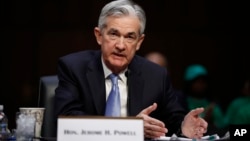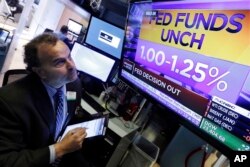Jerome Powell’s confirmation as the next chairman of the U.S. Federal Reserve appeared all but assured following a mostly orderly and cordial Senate hearing Tuesday.
Powell, who was nominated by President Donald Trump to succeed Janet Yellen when her four-year term ends in February, sought to reassure both political parties that while his nomination represented stability and continuity, he was also open to making changes where needed.
In his opening remarks, Powell said he would consider ways to ease the regulatory burdens imposed on banks after the financial crisis “so that banks can provide the credit to families and businesses necessary to sustain a prosperous economy.”
On interest rates, Powell said he expects “interest rates to rise further and the size of the Fed’s balance sheet to gradually shrink.” The Fed slashed short-term interest rates to record lows in 2009 in a bid to stimulate the US economy and boost employment. The Fed has raised interest rates four times since 2015 and is widely expected to raise its benchmark rate again in December.
Powell, a member of the Fed’s seven member board since 2012, is seen as a centrist having never dissented from the policies advocated by both Yellen and her predecessor Ben Bernanke. He defended the Fed’s low interest rate policies, saying it has helped bring millions of people back into the workforce without throwing financial markets into chaos.
Weak inflation however, remains an area of concern. While economists say lower borrowing costs might spark sharp price increases, inflation remains below the Fed’s 2-percent target rate. Powell said that may be due to lower fuel costs and recent cuts to cellular phone plans, but he expects inflation will rise as the economy nears full employment and companies start competing for workers.
Powell’s comments on rate hikes and deregulation boosted financial stocks, sending Wall Street indexes higher on Tuesday.








